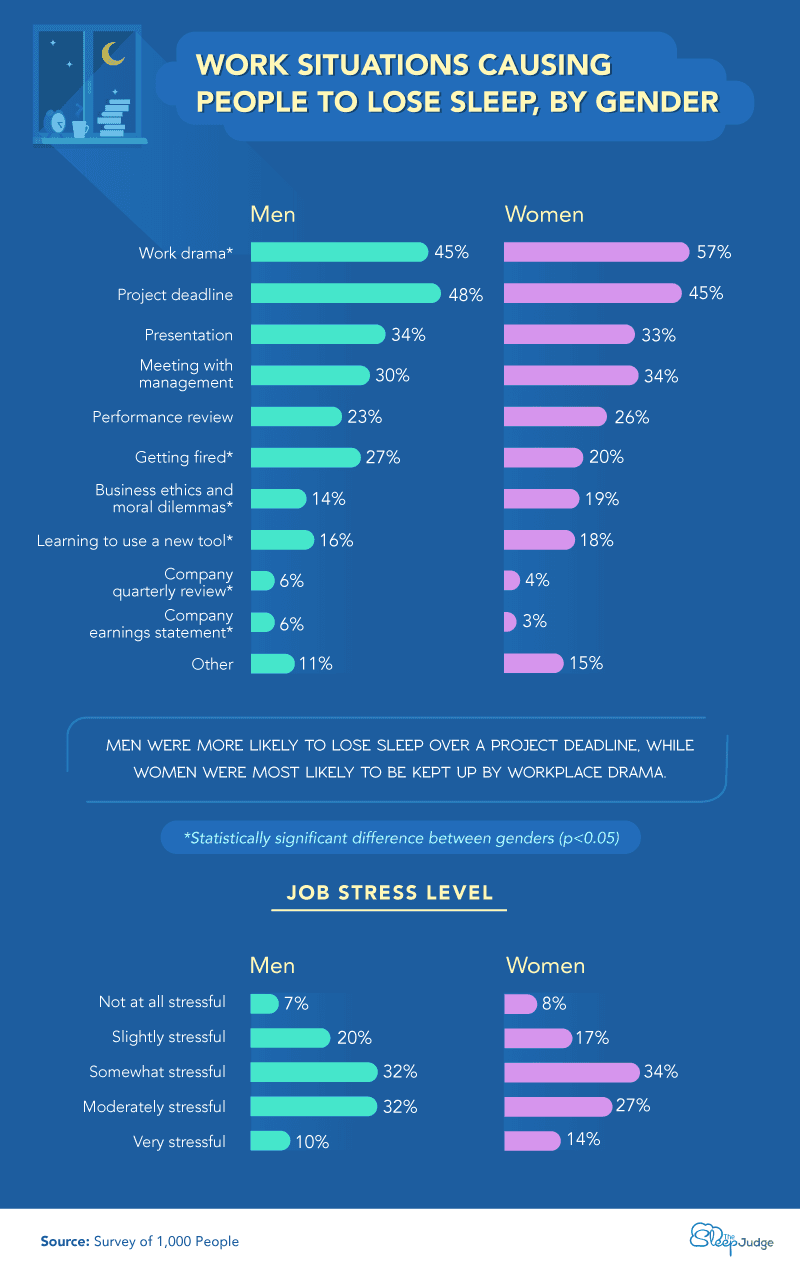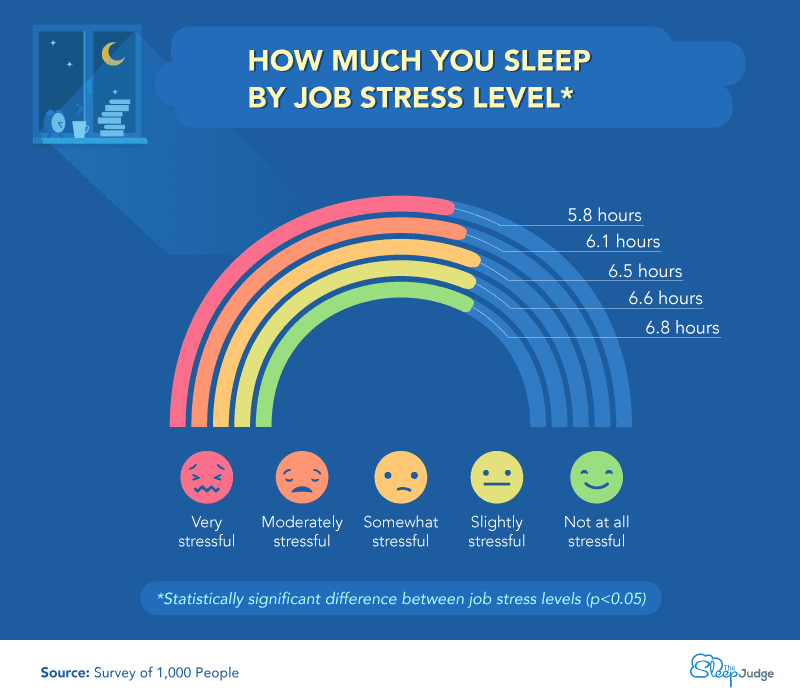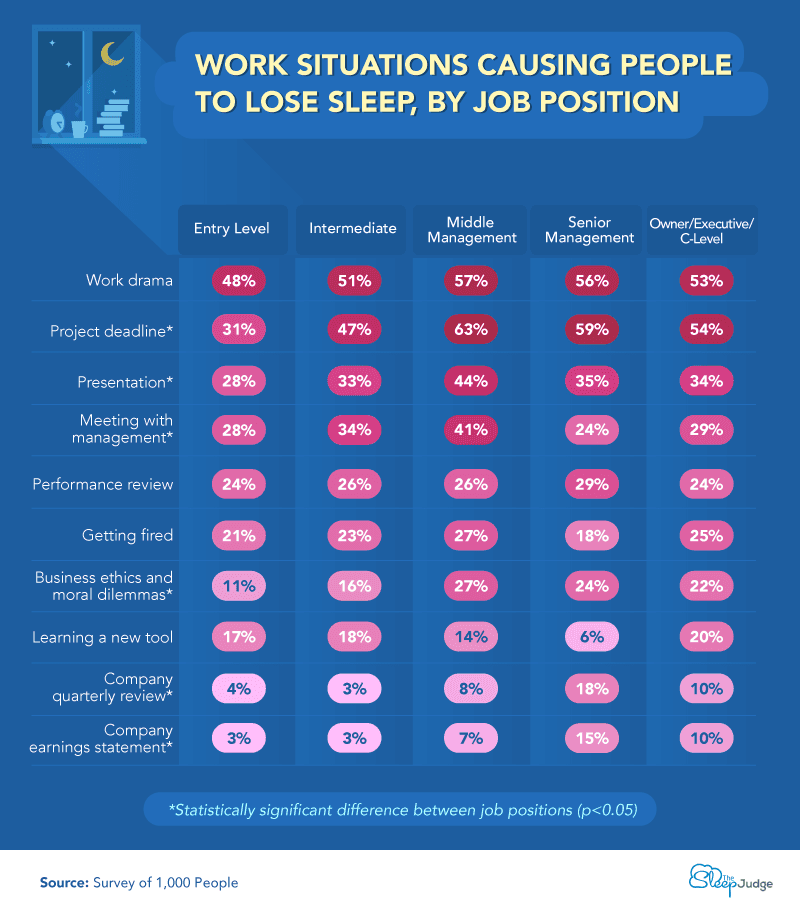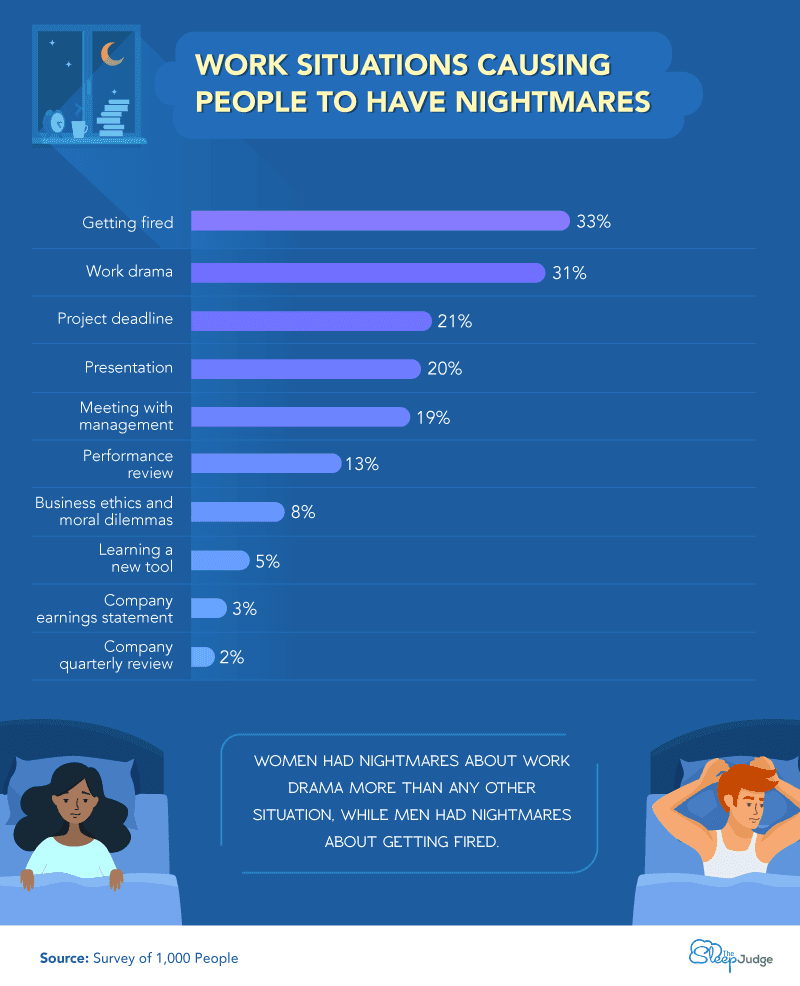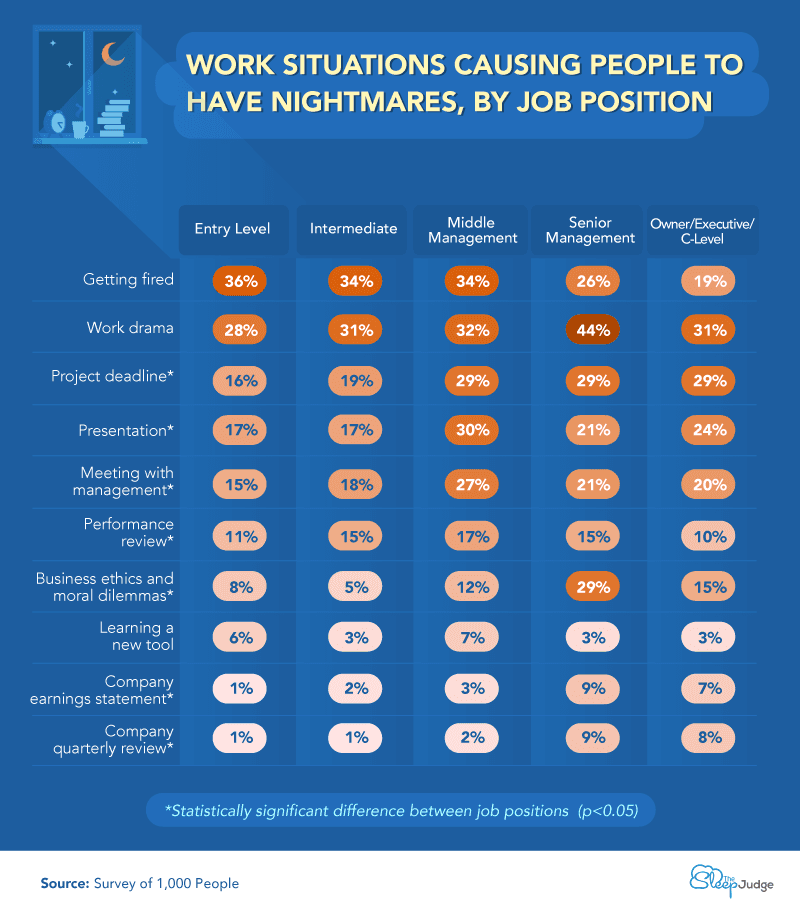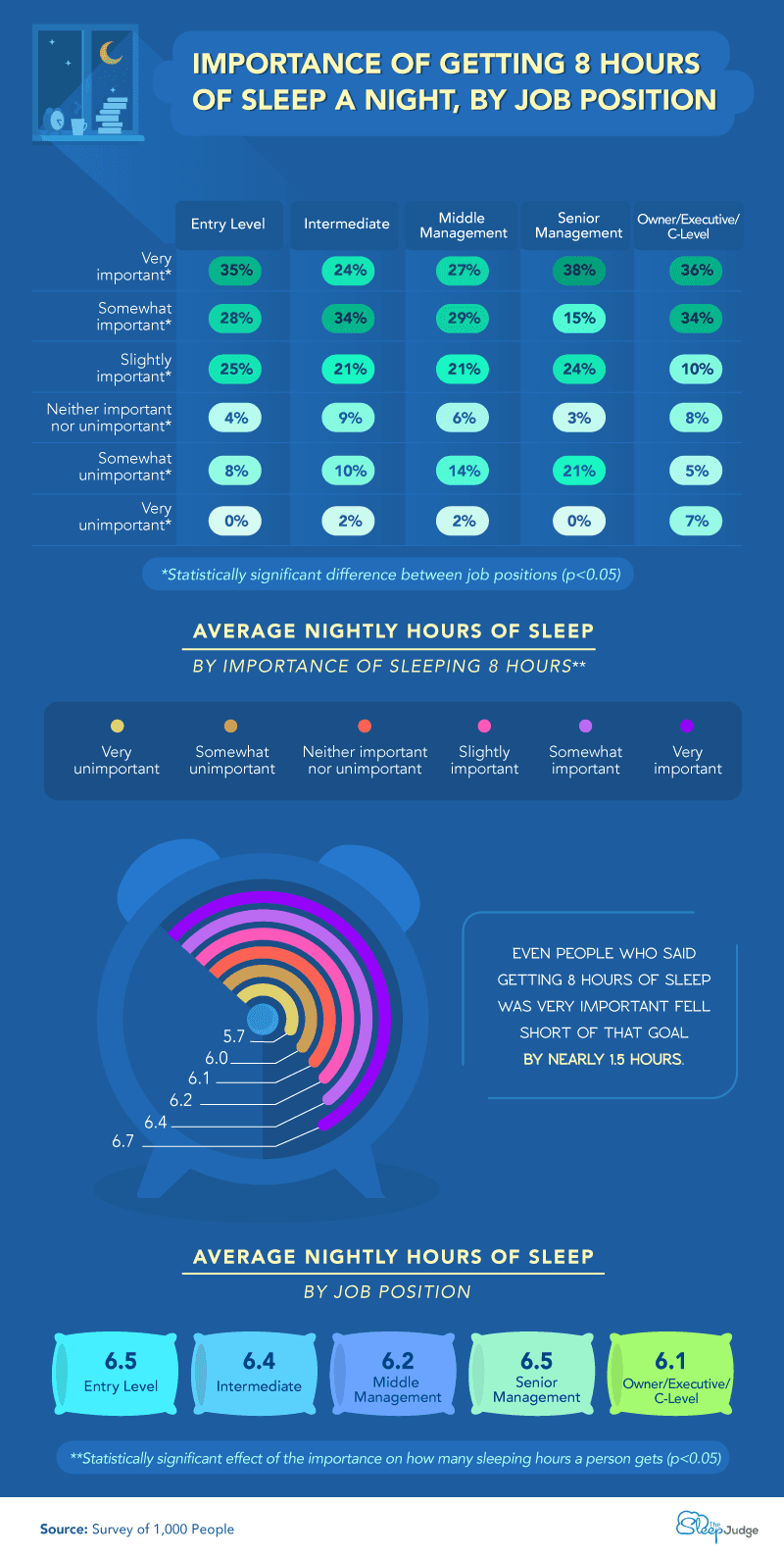If you’ve ever caught yourself staring at the same email for too long or can’t stop yawning through an important work meeting (no matter how many cups of coffee you’ve had), then you probably realize just how important healthy sleep is to your professional productivity.
But what happens when thinking about work responsibilities is what’s keeping you up at night?
To learn more, we surveyed 1,000 people about how their job stress, what they’re losing sleep over, and even what’s been giving them nightmares when it comes to their careers. Read on as we explore just how taxing those looming deadlines can be and how workplace drama might actually be more than just a nuisance.
Work’s Effect on Sleep
Deadlines and due dates aren’t the only things causing people to lose sleep. While 48 percent of men said project deadlines kept them up at night, 57 percent of women said they lost sleep over workplace drama. Men weren’t immune to feeling the effects of workplace drama, either, with 45 also saying that was something that kept them up at night.
No matter the industry you’re in, it goes without saying that not all co-workers are created equal. From the negative Nancys to the bad news bears and gossipmongers, studies show drama in the office can have a detrimental effect on individual productivity and team performance.1 Whether it stems from a poorly managed work culture or just a few bad apples, workplace drama won’t just deflate your day – it could result in a loss of zzz’s.
Roughly 1 in 3 men and women said giving a presentation was why they occasionally had trouble falling asleep, and around 1 in 4 people had the same issue when their performance reviews came around. Around 1 in 3 men and women considered their jobs at least “somewhat stressful,” and 32 percent of men and 27 percent of women said their jobs were “moderately stressful.”
Stress and Sleep
You may want to check out: Best Foot Massagers You Can Find
Stress sucks. No matter what’s got you down at work, the weight of those worries doesn’t always stay at the office when you’re ready to clock out. In reality, the emotional toll of stress can roll into our personal lives. You might feel less inclined to work out, catch yourself eating unhealthy food, or experience the pangs of elevated blood pressure or cholesterol.2 Even worse, the effects of a hostile work environment can increase the likelihood of a heart attack and other coronary diseases.
But if the stresses of your workday zap at your energy, there may be a solution to getting back on track: sleep. People who rated their job as “very stressful” slept less than six hours a night on average. In contrast, those who felt their jobs were only slightly or not at all stressful slept closer to seven hours each night.
If you’re skipping out on slumber, you could be hurting your judgment, cognitive capacity, and mood,3 making a normal day at the office feel more trying than if you’d gotten a full night’s sleep.
Dangers of Work Drama
When you’re just starting a new job, the biggest hurdle you may have to overcome isn’t working fast enough or being good enough at your task – it’s navigating office politics. Among both entry-level and intermediate employees, work drama was the biggest concern keeping them up at night.
Being a seasoned employee won’t make the burden of gossip between co-workers any less stressful, though. While project deadlines were often more taxing for people in middle management, senior management, and executive-level positions, the demand of navigating work drama still kept people in elevated roles from getting a good night’s sleep.
Thankfully, there are several ways to avoid being swept up in these histrionics.4 Experts recommend being careful about whom you decide to vent to, learning how to change the subject when a conversation starts to go sideways, and never repeating something you’ve been asked to keep to yourself.
Horror at the Office
Your dreams can sometimes be a clear indication that something’s on your mind.5 Even our nightmares are really just the brain’s way of processing an event, feeling, or new information. If you have reoccurring dreams where you’re being chased or can’t move, they’re indicative of running away from something in your life that you’d rather avoid. And if you’re having nightmares about your job, you’re not alone.
One in 3 people admitted to having nightmares about getting fired from their job. There are real signs you might be terminated from your job,6 but if you’re not seeing those indications while awake, dreaming about being let go could be a sign of something deeper. Thirty-one percent of people had nightmares about work drama, and 21 percent had nightmares about their project deadlines. Overall, men were more likely to have nightmares about losing their job, while women were plagued with terrible dreams about office drama.
Job Loss in Nightmares
Job seniority doesn’t just mean earning more money or get a bigger office – it also comes with more responsibility and stress.7
Seniority is often seen as a safety net in the unfortunate event of layoffs or downsizing, but you might have to climb relatively high up the corporate ladder to feel protected from losing your job. While entry-level employees had nightmares about losing their job more than anyone else (36 percent), intermediate employees and middle management (34 percent each) weren’t far behind. More than 1 in 4 people in senior management still had bad dreams about being let go, as did nearly 1 in 5 people in executive-level roles.
Climbing the corporate ladder may also mean having to worry about more than just your day-to-day tasks. Forty-four percent of people in senior management said they had nightmares about work drama, and 29 percent had bad dreams about business ethics and moral dilemmas. People in middle management were more likely to have nightmares about presentations at work and project deadlines.
Bedtime Priorities
Health experts recommend the average adult needs between seven and eight hours of sleep each night, and those aren’t arbitrary numbers. The amount of time we spend sleeping helps boost our immune systems, keep our memory intact, and manage our hunger levels – and can play a major role in how we feel throughout the day.
Decades of research show that not getting the recommended amount of sleep could actually lead to premature death.8 Moreover, if you’re feeling stress from your job to the point that you’re not sleeping well, there’s a very high likelihood the pressure you’re feeling is a direct response to the quantity (and quality) of rest you’re giving your body.
People in elevated job roles might have a better grasp of the importance of getting a good night’s sleep than people in intermediate or middle management positions. More than half of people in senior management said getting at least eight hours of sleep every night was either somewhat or very important.
However, across all job positions, people admitted to clocking in fewer than seven hours of rest on average.
Breaking the Sleep Cycle
You might know what it feels like to be run down the minute you sit at your desk. More than being a case of the “Monday blues” or looking ahead to the weekend, the weight of your job could also be keeping you up at night. As we found, if you’re tossing and turning over thoughts of getting fired or workplace drama, you’re probably going into work without getting the recommended amount of sleep. This can turn into a vicious cycle, one where not getting enough sleep makes you feel even more stressed or bogged down, leading to more anxiety about your job and fewer hours of rest.
If you’ve ever found yourself in this kind of situation, take a closer look at the sleeping habits of both entry-level employees at your job and senior management. They typically have the best understanding of how important getting enough sleep is to their productivity and performance, even if they don’t always practice what they preach.
Methodology
We surveyed 1,000 people about their job stress and what work situations caused them to lose sleep. Fifty-three percent of respondents identified as women, and 47 percent identified as men. The average age of respondents was 35.7 with a standard deviation of 10.79. All respondents reported losing sleep over stress at some point. Those who did not report losing sleep over job stress were disqualified from the survey along with those who failed attention-check questions.
Qualifying respondents were asked to rate their stress on the following scale:
- Not at all stressful
- Slightly stressful
- Somewhat stressful
- Moderately stressful
- Very stressful
When asked to rate the importance of getting eight hours of sleep a night, respondents were given the following scale:
- Very unimportant
- Somewhat unimportant
- Slightly unimportant
- Neither unimportant nor important
- Slightly important
- Somewhat important
- Very important
Questions relating to what situations people lost sleep over were check-all-that-apply questions, so respondents were able to choose more than one option.
Respondents were asked to identify their current job position. This is what we used to segment our data into levels of seniority within a company. Sample sizes for the various job positions were as follows:
- Entry level: 258
- Intermediate: 390
- Middle management: 201
- Owner/executive/C-level: 59
- Senior management: 34
It should be noted that 58 respondents selected “Other” when asked about their current job position. These respondents were excluded from the data representation within this campaign.
When asked about the stressful situations they lost sleep over and had nightmares about, respondents were asked if they’d ever lost sleep or had nightmares about those situations. It is possible that respondents answered based on experiences outside of their current position. This may have introduced some error into our segmentation of these data by seniority level.
The data we are presenting rely on self-reporting. There are many issues with self-reported data. These issues include but are not limited to: selective memory, telescoping, attribution, and exaggeration. Chi-square and ANOVA analyses were performed where noted. An asterisk indicates where the significance criterion of p<0.05 was met.
Fair Use Statement
Want to share this with your sleep-deprived co-workers? Feel free to share the results of our study with your readers so long as it’s for noncommercial use. And no need to lose any sleep over doing so, just make sure to link back to this page so that our contributors earn credit for their work too.
Sources
1Passage, D. (2017). How Office Drama Can Kill Your Career. Retrieved from https://www.huffingtonpost.com/diane-passage/how-office-drama-can-kill-your-career_b_9569524.html
2Molitor, N., & Weiss, S. (n.d.) Mind/Body Health: Job Stress. Retrieved from https://www.apa.org/helpcenter/job-stress.aspx
3Peri, C. (n.d.) 10 Things to Hate About Sleep Loss. Retrieved from https://www.webmd.com/sleep-disorders/features/10-results-sleep-loss#1
4St. Fleur, D. (n.d.) 4 Realistic Ways to Steer Clear of Office Drama (Without Being a Goody Two-Shoes). Retrieved from https://www.themuse.com/advice/4-realistic-ways-to-steer-clear-of-office-drama-without-being-a-goody-twoshoes
5What Your Nightmares Mean or Say About Your Mental Health. (2017). Retrieved from https://punchng.com/what-your-nightmares-mean-or-say-about-your-mental-health/
6Ward, M. (2017). Suzy Welch: 5 Signs You’re About to Be Fired. Retrieved from
https://www.cnbc.com/2017/08/22/suzy-welch-5-signs-youre-about-to-be-fired.html
7Heatherfield, S.M. (2018). What Seniority Means at Work. Retrieved from
https://www.thebalancecareers.com/what-seniority-means-at-work-1919372
8Nall, R. (2016). How Does Seven to Eight Hours of Sleep Affect Your Body? Retrieved from https://www.healthline.com/health/science-sleep-why-you-need-7-8-hours-night

